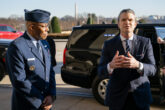April 23, 2020
Into the unknown: Military families struggle with Family Care Plans
There is an old saying around the military, “If the Army wanted you to have a family, they’d have issued you one,” implying families are extraneous to the needs of the organization or worse, beyond the concern of the military.
In reality, the military relies on families formally and informally for a critical mission: caring for dependent family members when the military member reports for duty. As the COVID-19 pandemic upends everyday life, military families are confronted with a jarring new complexity: their support network has significantly unraveled. Military leaders must take immediate steps to understand how their families are handling dependent care, now and as this crisis persists. Failing to do so risks not only readiness today, but retention of service members in the future.
The military plans for family separation. Currently, there are approximately 84,000 service members who fall into the categories of dual-military with children and single parents across the active-duty force that require a traditional Family Care Plan (FCP). These FCPs formally codify a plan between the qualifying service member (dual-military, single parents, and those with qualifying adult dependents) the on-call caregivers, and the command, to care for dependents over the short and long term. FCPs are key to ensuring the reliability of the service member for duty. However, military families who require FCPs and their commands face new challenges posed by COVID-19.
Read the full article in the Military Times.
More from CNAS
-
National Security Human Capital Program
Defending the Army’s Command Assessment ProgramThe concept for CAP — developed during the first Trump administration — benefited from the guidance, input and oversight from the foremost scholar and practitioner on military...
By Katherine L. Kuzminski
-
National Security Human Capital Program
‘Women Don’t Just Achieve…They Excel’: Fmr. Marine Corps Attack PilotDr. Kyleanne Hunter, former Marine Corps attack pilot and CEO of Iraq & Afghanistan Veterans of America, says “women are the fastest growing group of veterans” and “the fastes...
By Dr. Kyleanne Hunter
-
National Security Human Capital Program
Could the U.S. Bring Back the Draft?In this episode of At the Boundary, GNSI’s Dr. Guido Rossi sits down with Katherine Kuzminski, Director of Studies at the Center for a New American Security (CNAS), to explore...
By Katherine L. Kuzminski
-
National Security Human Capital Program
Hegseth Brings the Culture War to CombatThe fundamental challenge of military leadership lies in creating cohesive teams that can work together in an environment of mortal risk and, when called upon to do so, use le...
By Dr. Jason Dempsey




